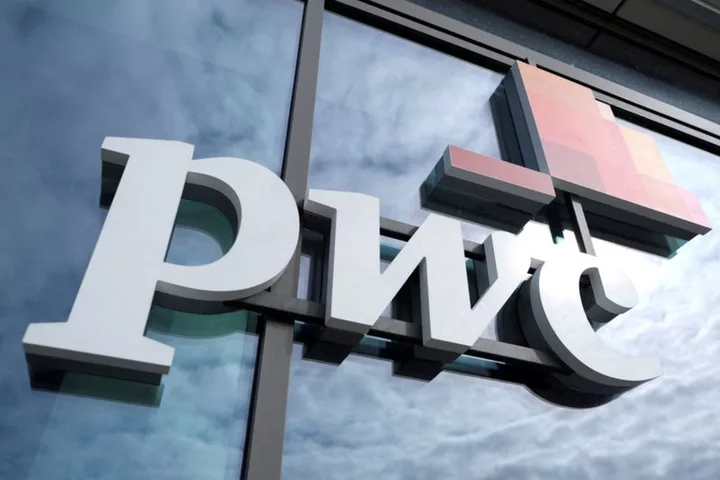The UK is considering whether to follow President Joe Biden’s move to limit US investment in some Chinese advanced technology companies, as Western nations seek to strike a balance between protecting national security with the economic necessity of trading with China.
Biden signed an executive order Wednesday to regulate US investment in some Chinese semiconductor, quantum computing and artificial intelligence companies — amid fears that the know-how transferred via joint ventures and other financing arrangements involving American firms in China are “helping accelerate the indigenization of these technologies.”
Read More: Biden Narrows China Investment Order as US Seeks Better Ties
In a statement issued shortly after Biden’s announcement, the British government said the president’s order “gives important clarity on the US approach.” A spokesperson for Prime Minister Rishi Sunak’s government said: “The UK will consider these new measures closely as we continue to assess potential national security risks attached to some investments.”
The UK and other European nations have been trying to navigate how to respond to the shifting ties between the US and China. Biden faced competing pressures, from China hawks arguing for faster, tougher action while others including the Treasury Department seeking narrower measures that would take longer to go into effect. In the event, the language of Biden’s order suggested that Treasury and those advocating a more cautious approach won out.
That narrower scope appears likely to gel with Sunak’s own approach to China, which has been to seek trade-friendly ties as far as possible without jeopardizing national security.
Asked whether Sunak was considering a similar measure to the US, a UK government official pointed only to the text of the so-called Atlantic Declaration the two sides signed in June. That document vowed to “respond effectively” to the risk that British investment and know-how could help rival countries develop security threats.
Read More: Sunak Tries to Fix China Ties Without Upsetting UK Hawks (1)
The official said the UK would need to examine the order and consult British companies and other stakeholders before determining its own next steps.
Still, the political balancing act is not straightforward for Sunak, who has opted to take a more nuanced approach to China than many more hawkish members of his own political party would like. Last month, the UK Parliament’s Intelligence and Security Committee warned Britain was “severely handicapped” in tackling Beijing’s economic dominance and spying capabilities.
Still, others call for strengthening ties. HSBC Holdings Plc drew criticism from British lawmakers after its head of public affairs criticized the US for strong-arming the UK into cutting back business dealings with China. He accused the British government of being “weak” for going along with it.
Tensions in the UK-China relationship are playing out in other ways. Beijing has accused the British government of failing to meet its diplomatic obligations over its plan to relocate its embassy to an historic building in east London. That has been rejected by local planners, and Chinese officials are frustrated that Sunak’s administration hasn’t intervened.
Read More: Five Tools Europe Will Use to Counter China’s Geopolitical Rise
Yet it’s not only the UK wrestling with how to handle China. The European Commission also said it will analyze Biden’s order, and plans to propose its own initiative on behalf of European Union members by year-end.
“We want to be sure we identify the risks and formulate a proportionate and precise response to these risks, without any negative unintended spill-over effects on the European and global economy,” it said in a statement. There is a “common interest” in preventing companies’ knowledge from enhancing “military and intelligence capabilities of actors who may use them to undermine international peace and security,” it said.
Within the bloc, though, there are different views. While the French finance ministry didn’t reply to a request for comment, the government of President Emmanuel Macron has so far resisted US pressure to get tougher on Beijing. Months after Macron visited China, Finance Minister Bruno Le Maire also met Chinese officials and companies to tout France’s attractiveness for investment CHK.
On the flip side, French prosecutors are investigating some French and Chinese citizens accused of sharing key semiconductor technologies with foreign powers including China and Russia.
Read More: Meloni’s Italian Populism Puts Investors, China on Notice
Meanwhile Italy’s cabinet this week voted to give the government special “golden share” powers to block technology transfers abroad in strategic sectors including artificial intelligence, production of semiconductors, cyber security, aerospace, and energy.
While not mentioning China, the measure was seen as likely to affect Italy’s commercial relations with Beijing by moving it away from the Chinese Belt and Road initiative. Italy’s move is in line with the EU’s European Security Strategy, a new tool that also deters interaction with nations like China in certain sectors, though also not referring to any country by name.
Responding to Biden’s order, China said it is “very disappointed” and warned that it will safeguard its own interests.
--With assistance from Alessandra Migliaccio, Sofia Gerace, Samy Adghirni and Andrew Atkinson.
(Updates with European reaction starting in 10th paragraph.)









